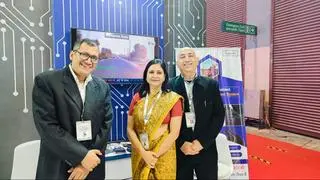Three years back when this column first profiled Tanuj and his venture, Planys had just one under-water robot or ROV that was being tested out. It was yet to launch commercially. And, the company was operating out of the Incubation Cell at IIT-M Research Park. Now, the company has six robots, undertaken 45 or so projects, has a steady income and moved into a much larger space in the southern outskirts of Chennai.
“From the time we met last,” Tanuj says, “we have come a long way. That time we had a minimum viable product, one with which we did some pilot projects and we raised an angel investment. The business model has remained the same of doing services, but we have more products in the market doing work. Our product capabilities have increased, the sectors we cater to have increased.” Earlier, the company’s focus was on ports and shipping. Now, it caters to dams, railway bridges and process industries. He says that Planys has handled about 45 projects in India, including some really tricky and sensitive ones, and it has started getting some international traction as well. This year, he hopes to do some international projects.
Planys has moved into a 7,000-sq ft facility and it used the money raised in the Series A round to create the necessary infrastructure, including a test pool for under-water testing and a chamber where it can imitate up to 200 m of depth testing. The team has grown to 55, including engineers to build the product, people on the field, specialists in electronics and robotics, those with offshore experience and for business development.

Infra investment
The investment in infrastructure was made keeping in mind the long-term requirements. Planys has also applied for the iDEX (Innovations for Defence Excellence) under the StartUp India programme. “We are hopeful that would convert in the near future for us,” says Tanuj.
From focussing on the ports and shipping sectors, Planys has now moved to other sectors. This followed enquiries for the under-water robots from other sectors, for shallow water testing. “We started getting traction. After doing pilot projects, we realised there are offerings for various other sectors as well. It is the same product being used everywhere, with some minor modifications,” says Tanuj.
He says with the capacity it has built up and the momentum it has gained, the next 6-8 months will be a period of further scaling up the business and activities and taking the venture to the next level. “Building more robots, looking at more volume of projects in India and maybe start doing some outside India,” he adds. “We have had some enquiries in the ports sector from Singapore and Europe. It is still early stage and we are exploring those.” Tanuj anticipates that the six robots the company has will see it through for another six months and more robots will be built depending on the demand. It has got some requests, particularly from the offshore industry, to get into deep water testing, but Tanuj says Planys will focus on shallow water testing, at least for the foreseeable future.
The vehicles that Planys build are smaller than foreign-made ones and obviously there will be some limitation. “You will not be able to drive a mini car into a desert,” he explains. Keeping in mind the business potential and costs, the company decided to confine itself to shallow water testing. Mostly dams in India will have 120-130 m depth, railway bridges will not be more than 20-30 m and ports 30-40 m, he explains.








Comments
Comments have to be in English, and in full sentences. They cannot be abusive or personal. Please abide by our community guidelines for posting your comments.
We have migrated to a new commenting platform. If you are already a registered user of TheHindu Businessline and logged in, you may continue to engage with our articles. If you do not have an account please register and login to post comments. Users can access their older comments by logging into their accounts on Vuukle.